Related Research Articles
This is a list of songs that have peaked at number one on the Billboard Hot 100 and the magazine's national singles charts that preceded it. Introduced in 1958, the Hot 100 is the pre-eminent singles chart in the United States, currently monitoring the most popular singles in terms of popular radio play, single purchases and online streaming.

"These Boots Are Made for Walkin'" is a hit song written by Lee Hazlewood and recorded by American singer Nancy Sinatra. It charted on January 22, 1966, and reached No. 1 in the United States Billboard Hot 100 and in the UK Singles Chart.
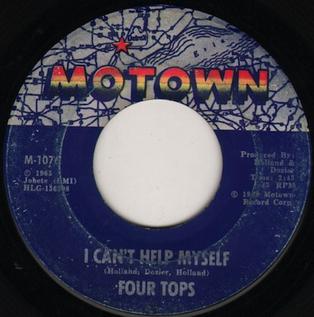
"I Can't Help Myself" is a 1965 song recorded by the Four Tops for the Motown label.
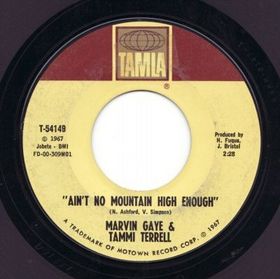
"Ain't No Mountain High Enough" is a song written by Nickolas Ashford & Valerie Simpson in 1966 for the Tamla label, a division of Motown. The composition was first successful as a 1967 hit single recorded by Marvin Gaye and Tammi Terrell, and became a hit again in 1970 when recorded by former Supremes frontwoman Diana Ross. The song became Ross's first solo number-one hit on the Billboard Hot 100 chart and was nominated for the Grammy Award for Best Female Pop Vocal Performance.
Rockers Revenge was a studio musical project, assembled by producer Arthur Baker in 1982. The group is most remembered by their 1982 post-disco hit "Walking on Sunshine", which peaked at number 1 on the US Dance Chart and number 4 in the UK.

"Keep It Comin' Love" is a song by KC and the Sunshine Band, released as a single in 1977. It appeared on their 1976 album, Part 3. The song, like its predecessor "That's the Way ", became widely successful due to its sexual double entendres.
"I'm Ready for Love" is a 1966 single by Motown girl group Martha and the Vandellas. The song, produced and written by Holland–Dozier–Holland, and was written in a similar style to The Supremes' smash hit, "You Can't Hurry Love".
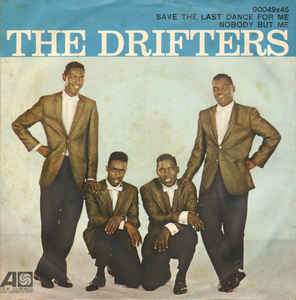
"Save the Last Dance for Me" is a song written by Doc Pomus and Mort Shuman, first recorded in 1960 by American musical group the Drifters with Ben E. King on lead vocals. It has since been covered by several artists, including Dalida, the DeFranco Family, Emmylou Harris, Dolly Parton, and Michael Bublé.
"It's All in the Game" is a pop song whose most successful version was recorded by Tommy Edwards in 1958. Carl Sigman composed the lyrics in 1951 to a wordless 1911 composition titled "Melody in A Major", written by Charles G. Dawes, who was later Vice President of the United States under Calvin Coolidge. It is the only No. 1 single in the U.S. to have been co-written by a U.S. Vice President or a Nobel Peace Prize laureate.
Donnie Calvin is an American reggae musician and singer. He was involved in Arthur Baker's studio project Rockers Revenge, which on September 18, 1982 had a number one hit on the Billboard Hot Dance Club Play chart with their version of Eddy Grant's "Walking on Sunshine" with Calvin as featured artist. The song also reached number 4 on the UK Singles Chart.
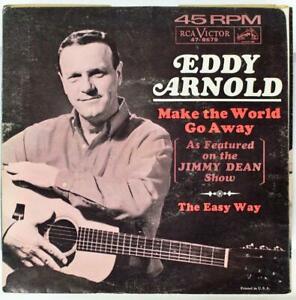
"Make the World Go Away'" is a country pop song composed by Hank Cochran. It has become a Top 40 popular success three times: for Timi Yuro (1963), Eddy Arnold (1965), and the brother-sister duo Donny and Marie Osmond (1975). The original version of the song was recorded by Ray Price in 1963. and popularized again by Mickey Gilley in (1999) has remained a country-crooner standard ever since.

"Electric Avenue" is a song written, recorded and produced by Guyanese-British singer and songwriter Eddy Grant, who released it on his 1982 album Killer on the Rampage. In the United States, with the help of the MTV video he shot for it, it was one of the biggest hits of 1983. The song refers to Electric Avenue in London, and to the 1981 Brixton riot in the Brixton district of the city.
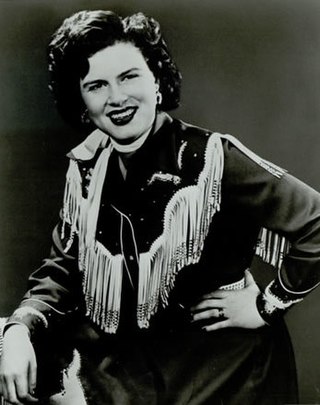
The discography of American music artist Patsy Cline consists of three studio albums, 24 singles, six extended plays, one compilation album, six other charted songs and one album appearance. Cline's discography contains material released during her lifetime. Her first recordings took place under the direction of Four Star Records. Cline's first single, "A Church, a Courtroom, Then Goodbye," was released in July 1955. Four Star issued 17 singles during Cline's four years recording with them. However, only "Walkin' After Midnight" (1957) became a major hit, reaching number 2 on the Billboard country songs chart and number 12 on the Billboard pop music chart.
"(Now and Then There's) A Fool Such as I" is a popular song written by Bill Trader and published in 1952. Recorded as a single by Hank Snow it peaked at number four on the US country charts early in 1953.

"The Harder They Come" is a reggae song by the Jamaican singer Jimmy Cliff. It was first recorded for the soundtrack of the 1972 movie of the same name, in which it is supposed to have been written by the film's main character, Ivanhoe Martin.

"Then You Can Tell Me Goodbye" is a song written by John D. Loudermilk. It was first released in 1962 by Don Cherry, as a country song and again as a doo-wop in 1967 by the group The Casinos on its album of the same name, and was a number 6 pop hit that year. The song has since been covered by Eddy Arnold, whose version was a number 1 country hit in 1968, and by Neal McCoy, whose version became a Top 5 country hit in 1996.
"She's Gone Gone Gone" is a country music song written by Harlan Howard and originally recorded by American singer Lefty Frizzell. Frizzell's version of the song reached number 12 on the Billboard Hot Country Singles & Tracks chart.
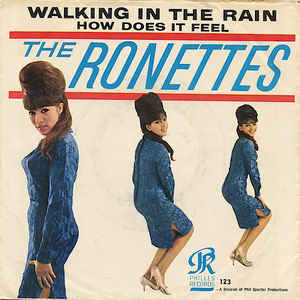
"Walking in the Rain" is a song written by Barry Mann, Phil Spector, and Cynthia Weil. It was originally recorded by the girl group the Ronettes in 1964 who had a charting hit with their version. Jay and the Americans released a charting hit cover of the song in 1969. The song has since been recorded by many other artists over the years, including the Walker Brothers.

Unforgettable – A Musical Tribute to Nat King Cole is a soundtrack album released in the UK in 1983 by the CBS Records division of Columbia in conjunction with the broadcast of American pop singer Johnny Mathis's BBC television concert special of the same name that featured Cole's daughter Natalie. The front of the original album jacket credits the concert performers as "Johnny Mathis and Natalie Cole", whereas the CD booklet reads, "Johnny Mathis with special guest Natalie Cole".

"Romancing the Stone" is a song written, recorded and produced by Eddy Grant, who released it from his 1984 album Going for Broke. It was intended for the 1984 feature film of the same name, in fact was announced by Casey Kasem on the 30 June 1984 edition of American Top 40 as the title song to the movie, but ultimately was used only briefly in the film. Clips from the film appeared in at least one official music video for the song, and the song is mentioned in the film's closing credits.
References
- ↑ "Eddy Grant - Walking on Sunshine".
- 1 2 Oliver, Peggy. "Eddy Grant". Soul Tracks. Retrieved April 3, 2024.
- ↑ Greene, Jo-Ann. "AllMusic Review by Jo-Ann Greene". AllMusic. Retrieved 17 November 2020.
- 1 2 "Official Singles Chart Top 100". Official Charts Company.
- 1 2 Whitburn, Joel (2004). Hot Dance/Disco: 1974–2003. Record Research. p. 220.
- 1 2 Whitburn, Joel (2004). Top R&B/Hip-Hop Singles: 1942–2004. Record Research. p. 498.
- ↑ "Rockers Revenge feat. Donnie Calvin – Walkin' on Sunshine" (in Dutch). Ultratop 50.
- ↑ "Rockers Revenge feat. Donnie Calvin – Walkin' on Sunshine" (in Dutch). Single Top 100.
- ↑ "Rockers Revenge feat. Donnie Calvin – Walkin' on Sunshine". Top 40 Singles.
- ↑ "British single certifications – Rockers Revenge". British Phonographic Industry.Select singles in the Format field. Select Silver in the Certification field. Type Rockers Revenge in the "Search BPI Awards" field and then press Enter.